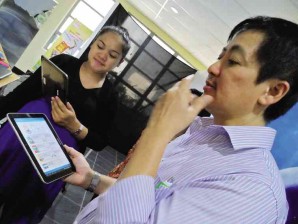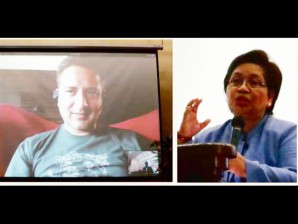Teachers: Level up, be tech savvy
Technology is the key to the future of teaching.
This was the message delivered by various speakers on day one of the Second Digital Education Conference:
K to 12 Teaching and Learning with Technology organized by the Philippine Normal University (PNU), Vibal Publishing House Inc. (VPHI) and Vibal Foundation.
In a packed conference room at PNU, speakers from various education sectors challenged an audience composed of accomplished educators to keep abreast of technology.
They pointed out that, in the digital age, students were quicker to adopt new technology and know how to use it while teachers were put at a disadvantage.
PNU president Dr. Ester Ogena said the basics of teaching had not changed but “the process and technologies have.”
Benjamin Quito, information and communications technology specialist of Southeast Asian Ministers of Education Organization Regional Center for Educational Innovation and Technology (Seameo Innotech), said not only have education websites mushroomed all over the Internet, “today, educational apps for smartphones and tablets are championing the cause of boredom-free education.”
M-Learning
The current movement was combining e-learning with what he referred to as m-learning (mobile education).
“The move toward digitization of education has commenced and the coming years will see a concretization in the field of personalized, mobile education,” Quito said. “The problem is the teachers are left behind. The students are better at using the technology.”
Ogena said teachers had to level up with students or do better than them, adding that she herself was learning every step of the way.
Vibe Technologies chief executive Gaspar Vibal said the younger generation found using technology almost as easy as breathing. They learned to fiddle with gadgets as quickly as they learned to walk and talk, effortlessly adapting to every digital upgrade.
He said the older generation must exert extra effort to keep up with the digital natives and cope with the changes.
The speakers pointed out, however, that the digital age also presented many distractions that took the kids’ attention from studying. Many of them were spending so much time online, usually on social networks.
Imagine if teachers and parents could take some of the time students spent on Facebook, Twitter or YouTube and get them to use it on learning online instead, said Quito.
Vibal pointed out that “we can’t rely on Facebook because it is public and there are a lot of predators online.”
He offered as an alternative the 100-percent Philippine-developed V-Smart app that, he said, would place the class in a “moderated and safe environment.”
V-Smart, Vibal’s “online/offline learning solution,” is an application designed for tablets that “aims to make education more accessible to digital natives.” The app currently runs on Windows, Android and iOS.
Launched during the conference, V-Smart has a Facebook-type feed that allows users (different versions are provided to teachers and students) to customize their own profiles; participate in discussions via polls, surveys or study groups; access Vibal e-textbooks and track progress, among other things.
Instant gratification
The V-Smart app also borrowed elements from “massively multiplayer online role-playing games” (MMORPGs)—mainly the achievement system where users get badges for completion of exercises—because, as Vibal said, today’s kids had the “instant gratification” complex.
Vibal said the MMORPG elements heightened the students’ interest “because you are communicating in their language. We need to capitalize on technology and social media because that is the language students understand.”
On the first day of the conference, Khan Academy dean of translations Bilal Musharraf addressed the participants via Skype.
He said the United States-based nonprofit organization was currently working with volunteers to translate video lectures into different languages to bring learning to even the remotest places, making the program even more accessible worldwide.
Educators with Internet access can visit khanacademy.com, which provides free online education.
Quito said mobile technology was now giving even remote areas access to educational materials. He said places in the Philippines like Talavera in Nueva Ecija, which has no DSL, could use 3G.
Despite the technical advances, Ogena stressed that “the formula cannot be perfect without teachers,” allaying fears that fewer teachers, perhaps even no teachers, would be needed in the future.
Vibal said, while students were learning on their own, they still needed supervision.
“Teachers are not being thrown out because of technology,” Quito said. “Technology is a tool, but teachers are still important. Google can teach history, but not the love for history.”
He stressed, “Teachers (help develop) critical thinking. The idea is to explore more, teach the teachers to use the technology for their growth.”
Quito said teachers must be equipped to teach their students how to use technology. They must be able to understand the students. “If we cannot get ahead of them, at least let’s not fall behind,” he said.
















